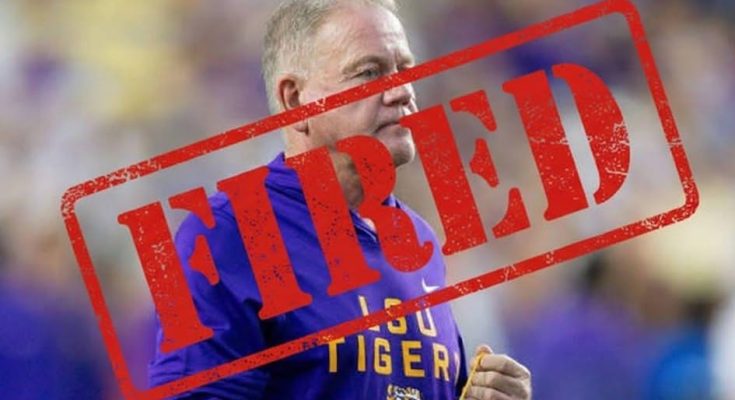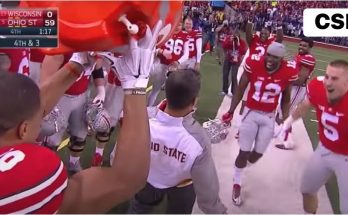The LSU Tigers have officially ended their partnership with head coach Brian Kelly, marking the end of an era that began with high expectations, controversy, and an ambitious vision to restore Louisiana State University’s football dominance. Kelly’s departure signals a major turning point for a program that has experienced both flashes of brilliance and deep frustration during his tenure. For a school steeped in tradition, success, and passionate fan support, this moment carries both relief and uncertainty, as LSU now faces the daunting task of rebuilding under new leadership once again.
When Brian Kelly arrived in Baton Rouge in late 2021, it was one of the most shocking coaching moves in recent college football history. After over a decade at Notre Dame, where he became the school’s all-time winningest coach, Kelly left the storied program for LSU—a move that symbolized both his hunger for a national championship and LSU’s desperation to return to the mountaintop after the highs of the 2019 Joe Burrow era. The hiring was met with optimism and skepticism alike. On one hand, LSU had secured one of the most successful coaches in modern college football. On the other, many questioned whether Kelly’s no-nonsense, methodical approach would mesh with the unique culture and expectations of LSU football and the broader Louisiana community.
The early days of his tenure were a mix of culture shock and cautious optimism. Kelly’s infamous “family” introduction at a basketball game became a viral moment that painted him as somewhat out of touch, and his attempts to connect with the Southern culture of LSU were mocked online. Yet, on the field, he began to establish order in a program that had suffered from instability since Ed Orgeron’s departure. His first season in 2022 was surprisingly successful, as LSU captured the SEC West title and earned a berth in the SEC Championship Game. With quarterback Jayden Daniels emerging as a dual-threat star and a new sense of structure within the team, it seemed Kelly’s vision was beginning to take shape.
However, the following seasons revealed deeper issues that ultimately derailed his tenure. While Kelly brought consistency in recruiting and discipline, LSU struggled to maintain elite defensive play and failed to develop the kind of national championship-caliber balance that fans demanded. Off-field concerns, locker-room tension, and questions about player development began to overshadow the flashes of brilliance. The Tigers often played up to their competition in big games, but they also faltered in key moments that defined their seasons—losses to Alabama, Florida State, and Ole Miss became painful reminders that LSU was still far from the powerhouse it aimed to be.
As the 2024 season came to a close, it became increasingly clear that the relationship between Kelly and the LSU administration was strained. Sources close to the program described a growing disconnect between Kelly’s coaching philosophy and the expectations of the athletic department. While LSU’s offense had thrived under Kelly and offensive coordinator Mike Denbrock, the defense remained an Achilles’ heel. Repeated defensive breakdowns, coupled with missed opportunities on the recruiting trail, amplified frustration among fans and boosters alike.
LSU is a program defined by high standards and immediate expectations. Three national championships in less than two decades—under Nick Saban, Les Miles, and Ed Orgeron—have set a precedent that few other schools can match. That history meant Kelly’s tenure was always going to be judged by more than just wins and losses; it was about whether he could return LSU to the peak of college football dominance. Unfortunately, despite strong offensive numbers and occasional marquee victories, he never delivered the breakthrough moment that would justify the massive investment LSU made in him.
Reports suggest that the separation between Kelly and LSU was officially termed as a “mutual parting,” though insiders describe it as a move largely driven by the university’s leadership. Athletic Director Scott Woodward, who was instrumental in hiring Kelly, faced mounting pressure from fans and donors frustrated with the lack of postseason success. Though LSU consistently finished with respectable records and remained nationally ranked, the Tigers were no closer to competing for a national championship than when Kelly first arrived. The administration’s patience had run thin, and with the competitive nature of the SEC escalating—especially with programs like Alabama, Georgia, and Texas surging—LSU could no longer afford mediocrity.
For Kelly, the LSU experience will remain a complex chapter in his coaching career. He brought discipline, academic structure, and a professional approach to a program that had long been defined by emotion and swagger. Yet, his greatest challenge seemed to be cultural alignment. LSU thrives on personality, energy, and passion—qualities embodied by Orgeron’s Cajun charisma or Saban’s relentless intensity. Kelly, known for his stern, businesslike demeanor, struggled to fully capture the hearts of Tiger fans, even when his team was winning. It was a partnership that always felt like a professional marriage rather than a natural fit, and ultimately, the lack of emotional connection may have been just as damaging as the on-field shortcomings.
The end of Kelly’s tenure also opens up a crucial question: where does LSU go from here? The Tigers remain one of the most desirable jobs in college football—a top-tier program with elite facilities, passionate fan support, fertile recruiting grounds, and a history of national success. Early speculation points toward several potential candidates, ranging from rising stars in the coaching world to established names looking for a new challenge. Whoever takes the reins will inherit a roster loaded with offensive talent but in need of defensive rebuilding and renewed cultural energy.
This moment also forces LSU to reflect on its identity. In recent years, the program has cycled through vastly different coaching personalities, from the eccentric Les Miles to the fiery Orgeron and then the meticulous Kelly. Each brought success in their own way, but none sustained it long enough to build a true dynasty. The question now becomes whether LSU can find a coach who not only wins games but also embodies the spirit of the program—a leader who understands both the competitive expectations and the deep cultural pride that come with wearing purple and gold.
For the players, Kelly’s departure will undoubtedly bring uncertainty. Many of the team’s stars, including those recruited under his leadership, will now have to decide whether to stay or enter the transfer portal. In the modern era of college football, coaching changes often trigger waves of roster turnover, making it critical for LSU’s next hire to stabilize the locker room quickly. Jayden Daniels, who flourished under Kelly’s system, may serve as a symbol of what could have been—a player who reached national prominence but whose team never fully capitalized on his brilliance.
As the dust settles, Kelly leaves behind a mixed legacy. Statistically, his tenure was far from disastrous, but in the context of LSU’s championship pedigree, it falls short of expectations. He took over a fractured program and restored order, yet he could not restore dominance. His teams were well-coached, efficient, and competitive, but rarely transcendent. In a conference as cutthroat as the SEC, “good” is often not good enough.
For LSU fans, the ending is bittersweet. There’s appreciation for Kelly’s professionalism and the stability he brought, but also a lingering sense of frustration that the bold gamble did not pay off. The Tigers’ faithful will now look ahead to the next chapter, hopeful that a fresh voice can reignite the fire that once made Death Valley the most feared venue in college football.
Brian Kelly’s exit marks the end of an experiment—one that tested whether structure could replace swagger, and whether discipline could deliver the same magic that passion once did. In the end, LSU’s heart beat louder than Kelly’s system. The Tigers now face the future once more, chasing the elusive blend of talent, energy, and leadership that can bring another championship back to Baton Rouge.
The Kelly era may be over, but LSU’s story is far from finished. In college football, endings always bring new beginnings, and in Baton Rouge, hope burns eternal beneath the Saturday night lights. The next coach will inherit not just a program, but a legacy—one built on the belief that in Louisiana, football isn’t just a game. It’s a way of life. And for LSU, the pursuit of greatness will never stop.



